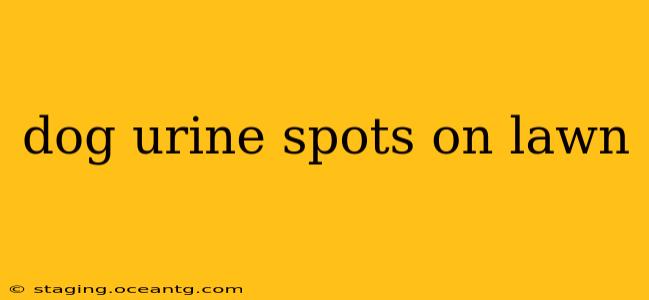Dealing with unsightly yellow patches on your lawn caused by dog urine is a common frustration for pet owners. These spots, often concentrated where your dog frequently urinates, are a result of the high nitrogen content in canine urine, which essentially burns the grass. This guide provides comprehensive solutions to identify, treat, and prevent these frustrating blemishes.
What Causes Yellow Spots From Dog Urine?
Dog urine contains high levels of nitrogen, a nutrient that, while beneficial for plants in moderation, can become toxic in concentrated amounts. When your dog urinates in the same area repeatedly, the concentrated nitrogen "burns" the grass, leading to those noticeable yellow patches. The alkalinity of the urine also plays a role, further stressing the grass and making it susceptible to damage. Breed, diet, and hydration levels can all influence urine concentration and the severity of the resulting damage.
How to Treat Existing Dog Urine Spots on Your Lawn?
Treating existing yellow patches requires a multi-pronged approach:
-
Water Dilution: The simplest approach is to dilute the urine immediately after your dog urinates. Use a watering can or hose to flush the area thoroughly. This reduces the concentration of nitrogen, minimizing damage.
-
Soil Testing: Before applying any treatments, a soil test can identify existing nutrient imbalances. This helps determine if your soil is already rich in nitrogen, which could exacerbate the problem. This testing allows for a tailored approach, preventing over-fertilization.
-
Topdressing: Applying a thin layer of topsoil can help alleviate the damaged area by adding fresh, healthy soil.
-
Reseeding/Replacing: For severely damaged areas, you may need to reseed or replace the affected patches of grass with new sod. This is a more involved solution, but necessary for significant damage.
How to Prevent Future Dog Urine Spots?
Prevention is key to maintaining a healthy, green lawn. Here are some effective strategies:
-
Encourage Frequent Urination in Different Areas: Train your dog to urinate in various locations around your yard. This distributes the nitrogen more evenly, preventing concentrated damage in one spot.
-
Water Regularly: Regular watering helps dilute the urine naturally, reducing the impact on the grass.
-
Adjust Your Dog's Diet: Certain dog foods can contribute to more concentrated urine. Consulting your veterinarian about diet adjustments might help reduce the nitrogen levels in your dog's urine. Increased water intake can also help dilute the urine.
-
Use Commercial Products: Several commercial products are designed to neutralize the nitrogen in dog urine or improve soil health to better withstand the impact. These products often contain enzymes that break down the urea in urine, reducing the damage.
What Are the Best Products to Treat Dog Urine Spots?
Many commercial products promise to neutralize or alleviate the effects of dog urine on lawns. These often contain enzymes or other agents to break down urea, the component responsible for the damage. However, always check reviews and follow the instructions carefully before application.
How Can I Make My Lawn More Resistant to Dog Urine?
Creating a resilient lawn helps minimize the damage caused by dog urine. Focus on:
- Healthy Soil: Maintain healthy soil through proper fertilization, aeration, and regular watering. Healthy soil can better tolerate the impact of nitrogen.
- Strong Grass Variety: Choose grass varieties known for their tolerance to high-nitrogen environments. A landscaper or local gardening expert can offer advice on suitable grass types for your region.
- Proper Lawn Care: Regular mowing, fertilization (in moderation), and weed control contribute to a strong, healthy lawn better equipped to withstand the stress of dog urine.
Can I Use Vinegar to Neutralize Dog Urine?
While some sources suggest vinegar, it's crucial to use caution. Vinegar's acidity can harm your grass, potentially causing further damage if not applied correctly. It's generally recommended to stick with proven methods like watering, soil improvement, and commercial products.
By implementing these preventive measures and employing appropriate treatments, you can significantly reduce the impact of dog urine on your lawn, maintaining a vibrant and healthy green space for you and your furry friend. Remember to always consult your veterinarian before making any significant changes to your dog's diet or routine.
